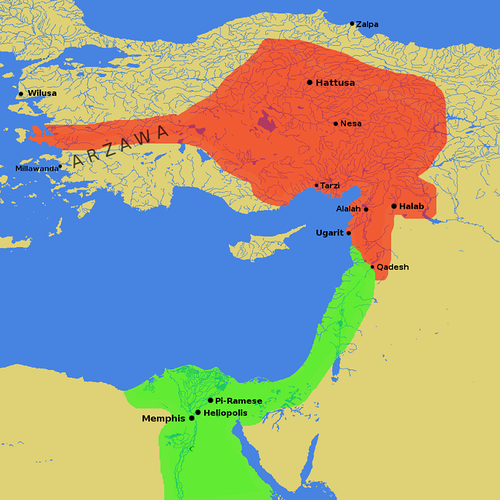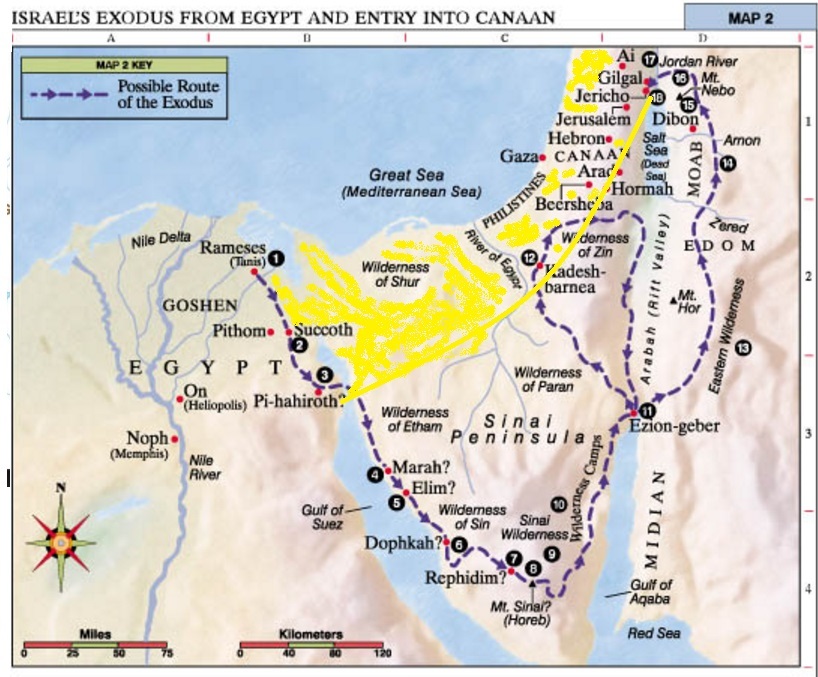@Jonathan_Burke, Okay … here goes …[My responses in bold brackets.]
[1] Egyptian hegemony. This is the only data point you address, and you make it your entire argument.
[You continue to dismiss the issue of hegemony. Incredible. Even the Bible scribe says the refugees of Exodus were avoiding the Philistines.]
[2] Immigration of new population into Canaan. You claim this is impossible because of the Egyptians, but the archaeological record shows it happened.
[People moved in and out of Canaan all the time … but a significantly numerous OUTLAW group could not have established an unmolested presence in Canaan.]
[3] Destruction layers indicating conflict between non-Egyptian ethnic groups. Again, this shouldn’t be happening according to your theory, but the archaeological record shows it happened.
[Even Dever allows for non-Egyptian ethnic groups. Even during the Amarna period you saw graphic accounts of hostilities and take-overs. Sometimes, all Egypt cared about was the punctual delivery of tribute/taxes. This is not the same as tolerating an Outlaw nation setting up a rival kingdom within Egypt’s frontier! ]
[4] Change of material culture showing Hebrew ethnic group moving into Canaan. Once more, this never happened according to your view, but the archaeological record shows it happened.
[I am perfectly happy with the idea that the predecessors of the Jews moving into Canaan. But if they weren’t molested prior to the arrival of the Philistines, then obviously they were not an outlaw group.]
[5] The Armana letters show Canaanite vassals of Egypt appealing for help because they are being overrun, yet Egypt fails to send troops to protect them and they fall. This is contra-indicatory to your theory of Egyptian supremacy in the region.
[What the Amarna letters show is that even at the very DEPTH of Egyptian complacency about Canaan, the Canaanite towns still considered Egypt “in charge”.]
[6] Egypt was unable to prevent Shasu incursions into the Nile Delta during this period, despite its fortifications. This undermines your theory of Egyptian military strength.
[In the ancient period, it was impossible to stop every raid, especially by nomads. Are you suggesting that 30,000 Hebrew dwelling in towns were as elusive as Shasu raiders?]
[7] Incursions of the Sea Peoples (including the Philistines), during the LBA taking territory from the Egyptians. This is contra-indicatory to your theory of Egyptian supremacy in the region.
[Jon, the Sea People was a highly numerous foe - - which was eventually defeated. Egyptian activity in Canaan from immediately after the defeat of the Sea People have been found. Many of the Sea People were re-settled and/or abosrbed into Egyptian mercenary forces. It appears that the final struggle, with the Sea People group called the Pelest, which finally broke Egypt’s hold over Canaan.]
[8] And the bonus question. Who conquered Hazor, burned it to the ground, and destroyed its cultic images?
[Hazor was significant Bronze Age settlement at the very northern tip of what we would eventually call Israel. Israel Finkelstein’s answer (from The Bible Unearthed) suits me just fine: “. . . the destruction of Hazor was the result of civil strife, attacks by the Sea Peoples, and/or a result of the general collapse of civilization across the whole eastern Mediterranean in the Late Bronze Age.” ]
Jon, you attempt to sweep the severe chronology problems away by your frequent emphasis that that Canaan was NOT as well policed or as tranquil as the Egyptian town of Memphis. On the latter, I concur! Canaan was hardly an example of uninterrupted tranquility. It was not some suburb of an Egyptian temple district. But do we really expect that in any outlying portion of an ancient Empire? It had lots of different people living there. But if a large armed force attacked Egypt, they would not be able to find sanctuary by setting up shop on the Levantine coast. . . . At least … not until the Philistines established themselves in their Pentapolis!
Your continual assertions or implications that they could ruins your reputation for objectivity. Redford describes temple plantations run and harvested in Canaan. Egyptian AND Hittite historical records show that Egypt treated Canaan as part of their empire. Compare this to the tone and content of the Biblical narrative about Canaan from the time of Abraham (who cavorted with Philistines) all the way to the time of Solomon. During that entire period, the Bible mentions a military exercise by Egypt just ONCE: the taking of Gezer, which the Bible says Pharaoh promptly gave to Solomon’s wife, the Pharaoh’s daughter.
If this multi-book narrative is an example of the Hebrew scribes to capture historical information, it would seem apparent that the Hebrew history of Palestine is highly flawed, and not to be relied upon.
Conversely, the books of Genesis, Deuteronomy, Exodus, Numbers, Joshua and Judges seem to adequately show that the Hebrew history is a fragmented collection of stories that have been pieced together to form a legendary chronology - - reflecting no genuine awareness of the pre-Philistine time period, as recently concluded as 1130 BCE.

